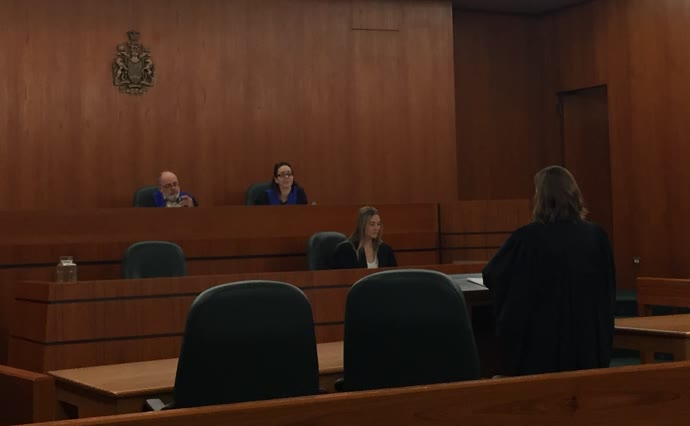
Moot court competitions are a fixture in Canadian law schools, and the University of Alberta Faculty of Law is no different. Mooting - whether at a local, regional, or national competition - is a unique part of the law school experience and a significant source of pride for any law school.
Fresh off a tremendously successful 2015-16 year - our mooters earned victories at the Sopinka Cup in Ottawa, the Bennett Jones Cup in Health Law Advocacy in Calgary, and the Alberta Court of Appeal Moot here at home - 98 second- and third-year students applied for the 2016-17 competitive moot season; our best numbers in five years.
To earn a spot on a UAlberta Law moot team, students must compete in the Brimacombe Selection Round, which took place this year on September 30 and October 3. This year's Brimacombe case asked whether frozen embryos should be permitted to be used after a couple has separated and when one spouse does not give consent. The winner of the Brimacombe Selection Round and moot team assignments will be announced on or before October 11.
"Approximately 75 students competed in the Brimacombe this year, including two who participated in a virtual tryout," said Stella Varvis, Director, Legal Research and Writing Program, and Coordinator, Competitive Moot Program. "These numbers represent a 19% increase from last year."
The competitive moot program gives students the opportunity to present an oral argument - as an appellant or respondent - in front of judges, spectators and peers, enhancing their experiential learning and giving them valuable courtroom experience while still a student. Judges rank participants' oral presentation on correct and articulate analysis of the issue, familiarity with the authorities, ability to defend propositions under questioning, poise, and clarity.
"We look forward to another successful moot season and thank all students for applying and participating in the selection round," said Ms. Varvis. "Good luck to our 2016-17 competitors."
Competitions throughout the moot season - with subject matter ranging from labour arbitration to health law to constitutional and human rights law - include traditional appeal formats such as the Gale Cup, the Bennett Jones Cup in Health Law Advocacy, and the Clinton J. Ford Competition. There are also two competitions in English and French (the Laskin and the Wilson); the Canadian Client Consultation Competition; a criminal trial competition (the Sopinka Cup); and a national Aboriginal law event (Kawaskimhon National Aboriginal Moot) which engages First Nations issues and dispute resolution principles. Participation in a competitive moot is worth three academic credits.